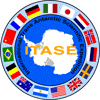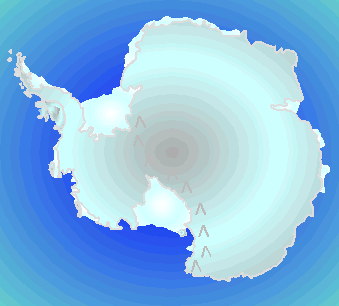
Hi! I am Jan French from Cincinnati, Ohio. I teach science to grades three
through five at Cincinnati Country Day School. Cincinnati Country Day is a great place to teach because I am given a lot of latitude with my curriculum. I have a lot of fun with my classes because we learn science by
doing science. Each class period consists of hands-on activities that lead
to concept development. There is never a dull moment! I have wanted to go
to Antarctica ever since I started teaching about the continent three years ago
to my fifth grade students. Every year I am awed by the beauty of the land
and animals.
After earning my B.S. degree at the University of Delaware, I spent ten
years as a geologist for the Federal Government, primarily with the U.S.
Geological Survey in Denver, Colorado. My main focus with the survey was
researching potential oil and gas reserves in the U.S. Atlantic offshore
areas. We didn't find much oil, but we had fun trying, and my
work has led to a better understanding of the geologic history of the area.
I became a stay-at-home mom with the birth of my daughter, Katie (now an 8th
grader at the same school as I). I stayed at home for six years with her
and then went back to school at Miami University (Ohio) to earn my teacher's
certification.
Outside of school, I read novels as much as time allows; I like suspense
novels. I also swim and feed my passion for traveling as much as possible.
My trip to Antarctica will be the ultimate experience and I can't ever
imagine topping that. I am so grateful for this opportunity, and I hope that
my contribution will enhance our understanding of the bottom of the world. I
would love to share my adventures with anyone who is interested, so don't be
shy about contacting me!

International Trans-Antarctic Scientific Expedition (ITASE)
Dr. Paul Mayewski and Dr. Gordon Hamilton, University of Maine
 I will be going to Antarctica as part of the U.S. contingent of the International Trans-Antarctic Scientific Expedition (ITASE). The overall objective of this 4-year program is to study the ice that covers all the major regions of Antarctica. I will be part of the 3rd American research team to go to the West Antarctic ice sheet to collect ice core samples. Ice cores are 3-inch diameter columns of ice that are drilled down to 150-200 feet below the surface of the ice. The ice cores will be shipped back to the U.S. for future research. Scientists will study the cores to detect changes in climate over the past 200 years. They find out how these changes have affected the ice in Antarctica, and how in turn, they have affected our whole planet. For example, if the world experiences a gradual warming in climate, then the ice in Antarctica will start to melt, which will cause a worldwide rise in sea level. Likewise, if the climate becomes colder, more water becomes frozen in the ice cap and causes a worldwide lowering of sea level. In addition, the effects of human activity on climate change can also be studied from the ice cores. These studies will eventually help scientists to make predictions of how the ice will respond to future climate changes.
I will be going to Antarctica as part of the U.S. contingent of the International Trans-Antarctic Scientific Expedition (ITASE). The overall objective of this 4-year program is to study the ice that covers all the major regions of Antarctica. I will be part of the 3rd American research team to go to the West Antarctic ice sheet to collect ice core samples. Ice cores are 3-inch diameter columns of ice that are drilled down to 150-200 feet below the surface of the ice. The ice cores will be shipped back to the U.S. for future research. Scientists will study the cores to detect changes in climate over the past 200 years. They find out how these changes have affected the ice in Antarctica, and how in turn, they have affected our whole planet. For example, if the world experiences a gradual warming in climate, then the ice in Antarctica will start to melt, which will cause a worldwide rise in sea level. Likewise, if the climate becomes colder, more water becomes frozen in the ice cap and causes a worldwide lowering of sea level. In addition, the effects of human activity on climate change can also be studied from the ice cores. These studies will eventually help scientists to make predictions of how the ice will respond to future climate changes.
United States International Trans-Antarctic Scientific Expedition
Secrets of the Ice: an Antarctic Expedition US ITASE web page hosted by the Boston Museum of Science.

 Because of her broken ankle, Jan will not be able to complete her journals from the field. Follow the U.S. ITASE trek across Antarctica by reading the expedition log at www.ume.maine.edu/USITASE/logbook2001.html.
Because of her broken ankle, Jan will not be able to complete her journals from the field. Follow the U.S. ITASE trek across Antarctica by reading the expedition log at www.ume.maine.edu/USITASE/logbook2001.html.
16 November, 2001:
13 November, 2001: How I Broke My Ankle
6 November, 2001: All 15 of us are now here
5 November, 2001: Hike up Observation Hill
4 November, 2001: Life at McMurdo Station
3 November, 2001: Meet Some of the Expedition Members
2 November, 2001: Robert Scott's Hut
1 November, 2001: Exploring McMurdo Station
31 October, 2001: Snow School, Day 2
30 October, 2001: Snow School
29 October, 2001: Going South
28 October, 2001: Packing Up!
27 October, 2001: On My Way
20 June, 2001: Wednesday, June 20th
19 June, 2001: Tuesday, June 19, 2001
18 June, 2001: Monday, June 18th
2 June, 2001: Saturday, June 2, 2001
7 August, 2000: Antarctica Is A Desert!!!
